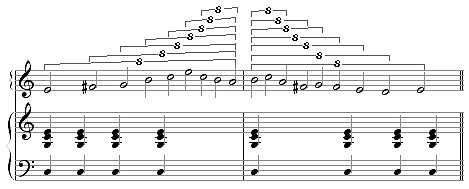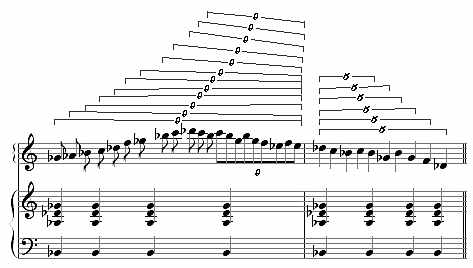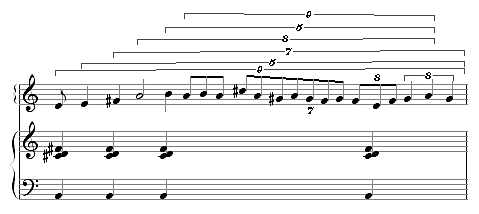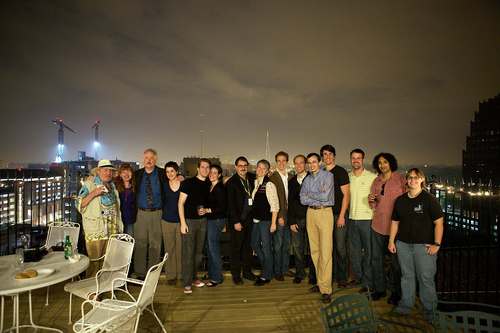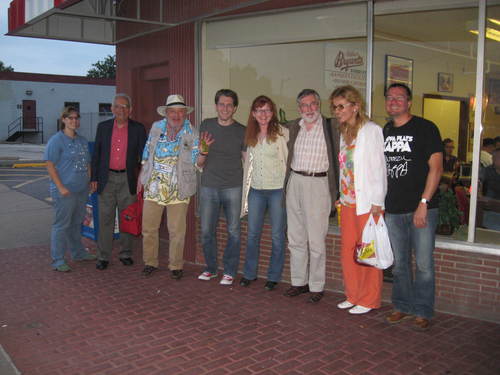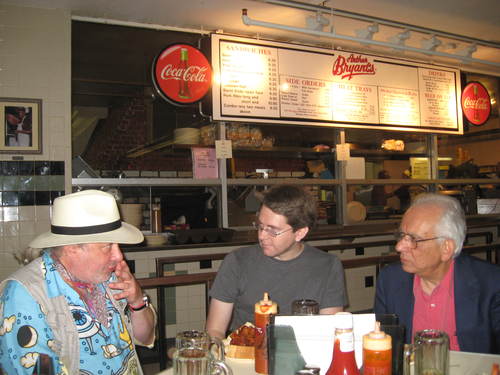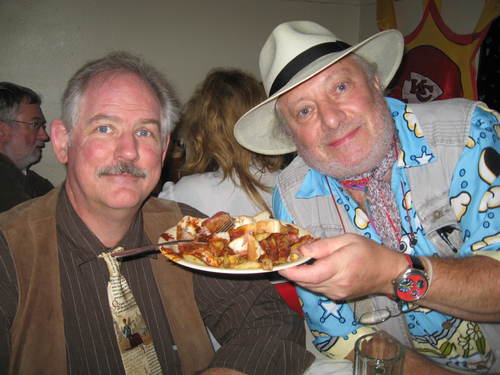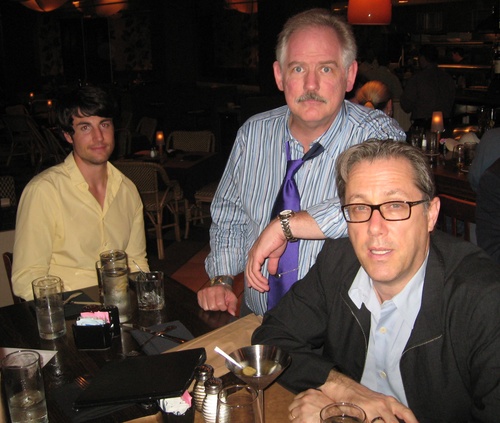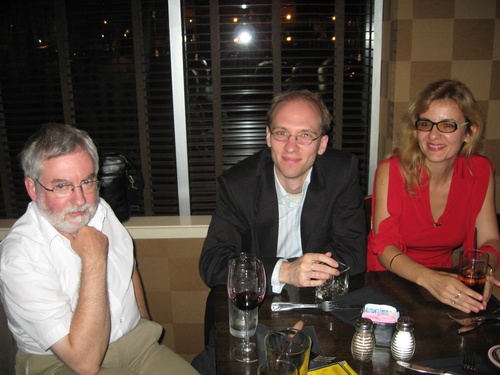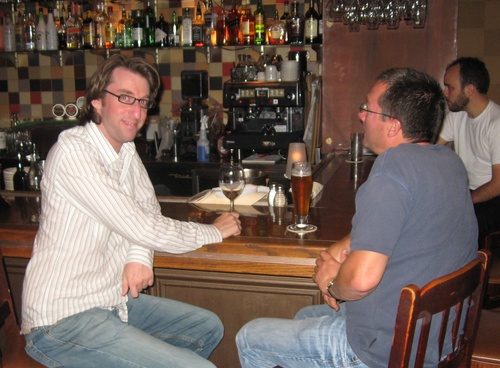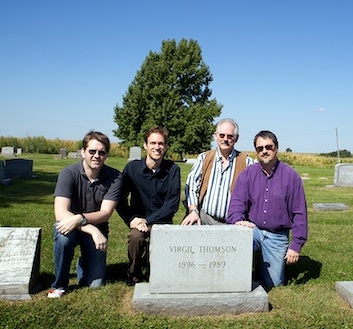PostClassic: September 2009 Archives
In comments, Ernest asks (and I'd rather address this than the article I'm supposed to be writing today):
I was always curious about what a student could do if their professors genuinely dislike the music they create. It seems like a giant imposition on the student to alter his style just to fit his or her teacher's expectation of good music. Is this at least expected of the student in so far as the course is concerned? I don't want to seem like I think this is the norm, but there has to have been overzealous teachers who try to discourage them into writing more traditional pieces, right?
Others will undoubtedly want to weigh in on this. I want to say I've never disliked a work by one of my students, though I have to admit it's not quite true. I've rarely completely liked one, either. When you watch a piece grow from its first inchoate ideas to some sort of performable score, you get, I think, more caught up with the process than the result. This is a strange and mysterious process with two egos involved, and your own is not the important one. I would never, ever tell a student that the overall effect he or she wants to create is of no value. I always feel most satisfied when I can pinpoint localized things in the piece that I think injure the whole shape or progress of the piece, and the student, in response, ignores my proposed solutions but takes the criticism seriously and comes up with his or her own revisions instead. That satisfies my sense of having made a difference, and the student's sense of having come up with every note. And to this extent, liking or disliking the piece, or its style, is beside the point. It may be a little like asking a gynecologist whether his last patient was pretty.
That said, in my situation, I'm the number 2 or 3 composition teacher at Bard, and so any sensible student who's going to write music in a style I don't care for is much better off studying with Joan Tower, whose tastes are the diametric opposite of mine and who can do much more for him professionally after graduation than I can. Joan seems to send me the students she gets whose music is "too tonal" or too deliberately uneventful. This is why I think it's so crucial that a music department aim for diversity of viewpoint among its faculty, which many refuse to do. I think to find an idiom that neither Joan, George Tsontakis, nor I would be sympathetic to, you'd pretty much have to be a staunch Ferneyhough acolyte, which is not common among undergrads. It's rare, in fact, for our undergrad composers to have much sense of style at all - their music is more often made up (as mine was at that age) of bits of this and that: a harmony they liked in Steve Reich, a melodic tic from George Crumb, some glissandos they heard in Penderecki. Now, I've never taught graduate composition students, and the few who've brought me their music have done so, as you can imagine, because it's in a style that they think is right up my alley (often coming to me because their own professors weren't sympathetic). If an accomplished 24-year-old composer brought me music conditioned by her passionate admiration of, say, Chris Rouse or Harrison Birtwistle, I'd have a quandary I haven't faced yet. I've never regretted teaching in an undergrad-only institution.
But when I haven't much liked hearing a piece by one of my students, it's usually with a feeling that "This student isn't much interested in the same things I am" - which is fine, because few of them are. And of course I would never grade them downward for that, because all that interests me grade-wise is how much work they put in - and that work can even be a lot of serious thinking and sketching, with little actual music to show for it. One of the smartest students I ever had used to analyze scores by prize-winning young composers and try to imitate them - certainly not a route I encouraged, but I watched him with amusement and added what suggestions I could. I gather that, in grad school, he eventually found that a dead end, but it wasn't in his interests for me to predict that. My teaching motto is from Blake: "If the fool would persist in his folly, he would become wise."
There are a lot of composers who feel that a student should try out every composition teacher in the department to get a variety of viewpoints, but I was never very sympathetic to that. Some of our students do it, and if they go back to Joan or George (or our excellent jazz composition teacher Erica Lindsay) I wish them well and continue to take an interest in their progress. I was the type of young composer who would not have benefitted from a stylistically adversarial relationship - and didn't, the couple of times it happened. (I had one abominable professor who acted so insulted when I suggested trying another teacher that I was afraid to switch. He was a horse's ass, and should have been fired, but instead made students miserable for several decades.) But I do think that the type of composition teacher who insists on the student writing in his or her own style - not nearly as common as they used to be in the '60s and '70s, apparently - is very much to be regretted, and I think most composers of my generation have realized the harmful effects of that. Anyone disagree?
And to return the original question to its original context in connection with the minimalism conference: if the musicologists at Bard wanted to hold a serialism or Spectralism conference, or one on the New Romanticism or New Complexity, I would find that interesting rather than threatening, and would probably attend some of it with a curious attitude. My compositional motto comes from Satie: "Show me something new, and I'll start all over again."
I shouldn't go too far in complimenting elements of a conference I helped plan, but I will make a few evaluative comments that hopefully won't reflect on myself. Sarah's elegantly flowing performance of Harold Budd's Children on the Hill proved to my satisfaction that a transcription of the piece can be played in a spirit virtually indistinguishable from Budd's own. I'll post the recording as soon as I get it. She also reminded me of what a gorgeous piece Meredith Monk's St. Petersburg Waltz is, and she introduced quite a few participants who hadn't heard of it to Hans Otte's scintillating The Book of Sounds, creating quite a stir for the piece.
No quantity of listening to Charlemagne Palestine CDs could have prepared one for the mammoth presence of his organ performance Schlingen-Blängen, a piece he first played in 1965 but had never played in the U.S. before outside Los Angeles. (In fact he'd never visited the Midwest before.) As we entered Grace and Holy Trinity Cathedral, a perfect fifth was already ringing on the organ. Little by little Charlemagne added notes, held down with little wooden splints, and pulled out additional organ stops to thicken the roar of sound. Finally he plunged onto the keyboard with both forearms, and, with overtones at maximum ferment - pulled the plug. The sound died in a swooping glissando, came back on, and did so twice more, in a powerfully dramatic effect. There was an audible bass line running through much of the piece, and after the organ finally died away for the last time, Charlemagne rang a drone on the rim of a cognac glass and sang the bass line in falsetto - it was the final ostinato melody from Stravinsky's Firebird, not recognizable as such in the melee of drones. Here are Scott Unrein's photos of the church as it looked to us, with the organ in the background and Tom Johnson's ghost arising from the time exposure:
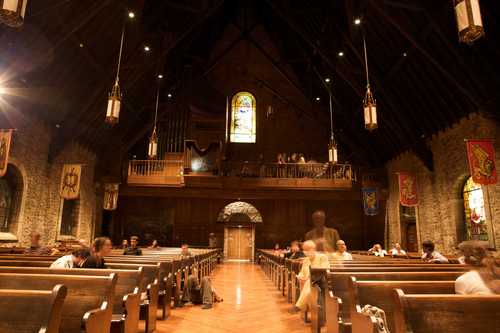
and Scott's portrait of Charlemagne in action:
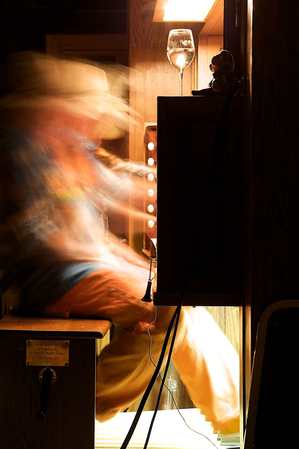
Despite his recent book on Terry Riley's In C, Robert Carl's own music is not noticeably postminimalist, and so he may have seemed like an odd choice for keynote speaker, but he was pitch-perfect. He first dismissed the facile platitude that minimalism might have been nature's way of clearing the decks from serialism and making it possible to return to the relative "normalcy" of orchestral music like that of John Adams; instead, he said (and I'm paraphrasing from memory after a hectic teaching week), the radicalness of early minimalism was no mere aberration but a continuing and essential feature of the style. He then went on, as only an outsider to the movement could have, to detail what he thought minimalism had contributed to early 21st-century music in terms of flow and transparency. It was a moving tribute, and I told Robert afterward how much better he does public sincerity than I do.
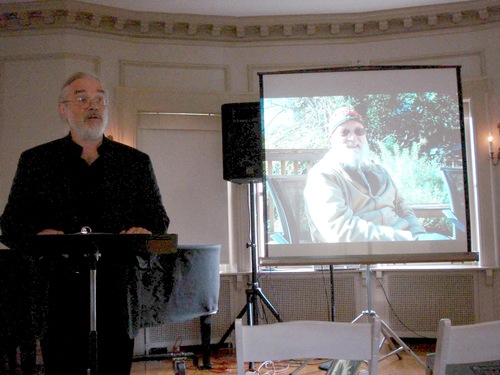
As I've said, I had hoped that the conference would bring about some potent distinctions between minimalism and postminimalism. Galen Brown's brilliant paper "Process as Means and End in Minimalist and Postminimalist Music" achieved a climax in that respect, widely noted as such. For Galen, minimalist music cared about process as a means regardless of what the sonic result was; postminimalist music uses process only to the extent that it achieves the sound the composer hears in his head. It was an admirably clear formulation, and I haven't yet found a loophole in it. That paper, along with two others by Kevin Lewis and Andy Bliss, provided a remarkably rounded view of David Lang's aesthetic, showing how willing he is to derive materials from processes that the listener can't necessarily hear, yet disrupts his own processes sporadically to make his music more human. Scott Unrein drew out the sensitive subjectivity in Jim Fox's music, and introduced that name to many present.
I'm disappointed that we didn't get any of composer Paul Epstein's music on the concerts, but his paper gave an absorbing account of the compositional structures he's derived in the technique called "interleaving" that he took from Reich's Piano Phase, which he's developed into a surprisingly wide-ranging postminimalist technique. A paraphrase of his paper could make an entire chapter in this Music After Minimalism book I'm allegedly working on. Sumanth Gopinath and Gretchen Horlacher offered analyses of, respectively, Reich's Different Trains and Tehillim that made me realize that my listening to Reich has become one-dimensional, as though I only hear what I've already come to expect. Sumanth in particular drew resemblances to tropes from various popular musics, and made me hear the music anew.
As for Dennis Johnson's November, which Sarah and I gave the world re-premiere of, our rendition took four and a half hours, switching pianists every hour. The experience showed me a few things I still want to refine in my version of the piece. Luckily Sarah got the more melodic sections and made them heavenly. I realized that my own rusty piano technique was barely adequate even at November's leisurely tempo, but afterward Neely Bruce - a dynamite pianist himself - described my playing to me in detail in a way that made me feel good about it. I certainly loved doing it, and it's the first time since the mid-1980s that I've performed, in a professional setting, anyone's music except my own. Several conference participants had to leave to catch planes during the interim, but the 19 who managed to hang on to the end gave us a standing ovation, which in my case I took more as a compliment to my hard work and endurance than to my pianism. (Photo by Robert Carl)
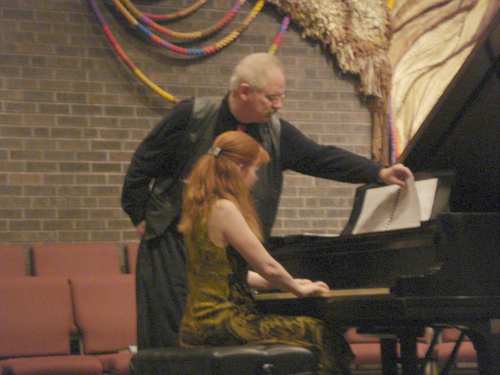
I got home Tuesday at 1 AM and faced an eager Renaissance counterpoint class nine hours later. My luggage followed on Wednesday afternoon.
Per our group deliberations, the Third International Conference on Minimalist Music will take place - [drum roll, please] - in mid-October of 2011 at the University of Leuven in Belgium, a medieval university town 15 minutes from Brussels by train, under the leadership of Maarten Bierens. I already can't wait. There was copious discussion of what institution in the U.S. might pick up the Fourth conference in 2013, but the story in every case was the same: at each representative's school we considered, the musicology faculty would welcome the opportunity, but the resident composition professors would shout it down. That UMKC showed us such hospitality has made it one of the handful of schools I now recommend my student composers to consider for graduate studies. Musicology is the field through which minimalism is making its way into academia, and it is remarkable how many young minimalist-oriented composers, several of them in attendance in Kansas City, are getting their degrees in musicology as a way of bypassing the hidebound stodginess of the academic composing world. This conference is a confederacy of (mostly) young composers and musicologists allied to break the grip of modernism's stranglehold on American academic composition departments. Our success in that venture is only a matter of time. God bless the musicologists for their exuberantly erudite support.
UPDATE: Pardon me, but I like this photo of me, by Robert Carl, explaining November:
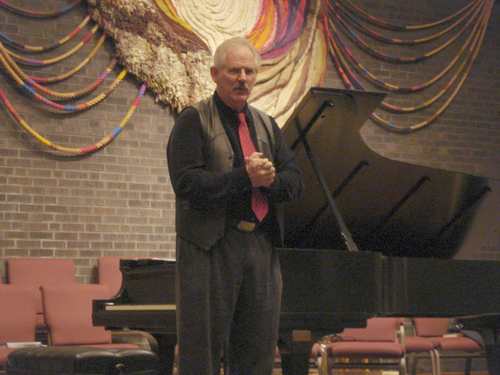

Sites To See
AJ Blogs
AJBlogCentral | rssculture
Terry Teachout on the arts in New York City
Andrew Taylor on the business of arts & culture
rock culture approximately
Laura Collins-Hughes on arts, culture and coverage
Richard Kessler on arts education
Douglas McLennan's blog
Dalouge Smith advocates for the Arts
Art from the American Outback
Chloe Veltman on how culture will save the world
For immediate release: the arts are marketable
No genre is the new genre
David Jays on theatre and dance
Paul Levy measures the Angles
Judith H. Dobrzynski on Culture
John Rockwell on the arts
innovations and impediments in not-for-profit arts
Jan Herman - arts, media & culture with 'tude
dance
Apollinaire Scherr talks about dance
Tobi Tobias on dance et al...
jazz
Howard Mandel's freelance Urban Improvisation
Focus on New Orleans. Jazz and Other Sounds
Doug Ramsey on Jazz and other matters...
media
Jeff Weinstein's Cultural Mixology
Martha Bayles on Film...
classical music
Fresh ideas on building arts communities
Greg Sandow performs a book-in-progress
Harvey Sachs on music, and various digressions
Bruce Brubaker on all things Piano
Kyle Gann on music after the fact
Greg Sandow on the future of Classical Music
Norman Lebrecht on Shifting Sound Worlds
Joe Horowitz on music
publishing
Jerome Weeks on Books
Scott McLemee on books, ideas & trash-culture ephemera
theatre
Wendy Rosenfield: covering drama, onstage and off
visual
Public Art, Public Space
Regina Hackett takes her Art To Go
John Perreault's art diary
Lee Rosenbaum's Cultural Commentary
